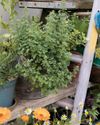
Every September in South Africa, the verges and hillsides are adorned with agapanthus, looking like swathes of monstrous bluebells. When I commented on the wonder of it, my hosts smiled slightly wearily - they had obviously gone through this many times before with northern hemisphere travellers - and pointed out that a few in the right place were fine, but in the main they were an invasive and dreary weed.
Would that I had such weeds here. As it is, I do have agapanthus growing at Longmeadow and have had for many years now. They are all in pots where I can give them a little micro-version of their preferred conditions (which are found in Southern Africa as well as California and some parts of Australia).
Although many agapanthus are hardier than people might think and do not mind summer moisture, it is the killer combination of cold and wet that will rot their roots to a mush in winter. And in my part of the world, in deepest Herefordshire, cold and wet are as guaranteed as night and day for much of the year. But give them the conditions they like, which is really not difficult, plus a little winter protection, and they will reliably perform year after year. On top of that, they are more or less impervious to slugs, rabbits and most other troubles.
The major problem for any agapanthus, however, is disturbance, and if moved or repotted the plants tend to show their resentment by ceasing to flower for a few years. The traditional advice, in the days when all flowerpots were terracotta, was not to repot an agapanthus until the roots cracked the pot, and then to only move it up to one size bigger.
This story is from the {{IssueName}} edition of {{MagazineName}}.
Start your 7-day Magzter GOLD free trial to access thousands of curated premium stories, and 9,000+ magazines and newspapers.
Already a subscriber ? Sign In
This story is from the {{IssueName}} edition of {{MagazineName}}.
Start your 7-day Magzter GOLD free trial to access thousands of curated premium stories, and 9,000+ magazines and newspapers.
Already a subscriber? Sign In

A new plot for tasty crops
Taking on a new allotment needn't be hard work. By simply following a few easy tips you can have bumper crops in no time, just like Alessandro Vitale

We love July
July is an island floating between the joy of June and the slightly fatigued month of August. It's a grown-up month: the year has shrugged off its adolescent exuberances, the weather is (hopefully) warm enough for ice cream to be one of your five a day, the sea should be swimmable without (too much) danger of hypothermia and thoughts will be of holiday shenanigans and family barbecues. School's out this month, the next tranche of glorious summer colour is washing across our borders and it's my birthday. Lots of reasons to give three rousing cheers for July!

YOUR PRUNING MONTH
Now, at the height of summer, Frances Tophill shows how to boost your plants' health and productivity with a timely cut

Hassle-free harvests
Flowers are out in abundance this month and for Jack Wallington, many of these blooms make delicious, low-effort pickings

Bite-sized bounties
Glorious doorstep harvests can easily turn into gluts, so let Rukmini Iyer's recipes help you savour every last bit

Upcycled outdoor living
Create unique and stylish garden features for minimal cost using reclaimed materials and simple DIY skills. Helen Riches shares four step-by-step projects and more inspiring eco tips

Secrets of a COLOURFUL GARDEN
Buildings and landscapes can play a vital role in supercharging your space, as Nick Bailey demonstrates

Greening up a city balcony
Looking for sustainable, small-space gardening ideas? Take inspiration from Oliver Hymans' transformed balcony garden in north-east London - now a lush, green haven for humans and wildlife

The dry and mighty garden
As we adapt our gardens to a more volatile climate, Alan Titchmarsh reveals how to create a drought-tolerant plot and picks his top plant performers

Nature knows best
Carol Klein explains how to choose plants for specific growing conditions, based on what has naturally adapted to thrive there